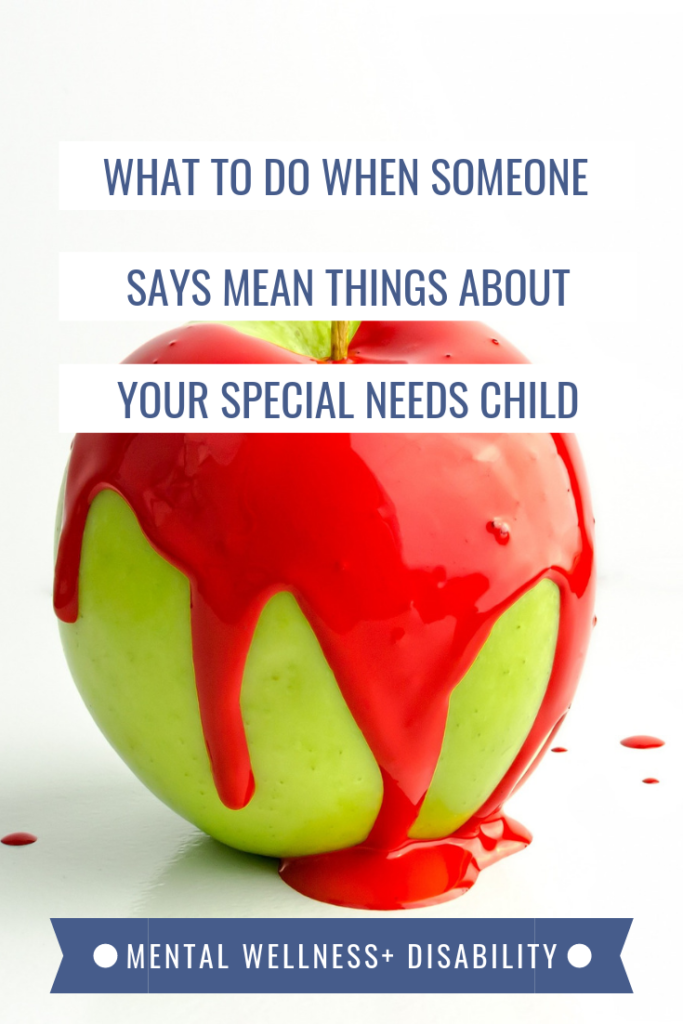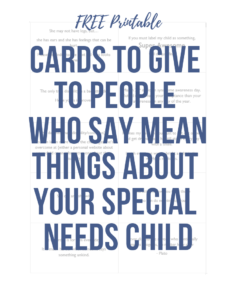I’m delighted to have been a guest this week on Passporter’s Disney Every Week podcast!
I really enjoyed chatting with hosts Sara and Jennifer. We talked about considerations for special needs families who are trying to decide between a Disney cruise and a trip to Walt Disney World. You can listen to our conversation here.
At the end of the Podcast, Sara and Jennifer asked me to give my #1 tip to families planning a Disney trip.
My tip for special needs families was to have a plan for how you will deal with nasty looks and rude comments about your child from others.
Of course, you know that this doesn’t just happen in Walt Disney World.
As a special needs parent, you know that this senseless cruelty can happen anywhere. In the grocery store, at the movie theater, on the playground. But at a place like Walt Disney World, which is supposed to be a safe haven for families, it can sting just a bit more.
My goal this week is to share some of my favorite tips and options for how to handle people saying mean things about your special needs child, no matter where you are.

Why preparing how you will to respond when people say cruel things about your special needs child is essential
Because I hear from special needs parents in counseling who didn’t, and who regret it.
These parents were shocked, angered, and hurt. They were so overwhelmed by the horrible thing someone said to their child that they became paralyzed and didn’t respond.
When I talk to those parents in my office, they feel extreme guilt. Guilt that they:
- didn’t know what to say.
- missed a chance to stand up for their child.
- didn’t show their child how to stand up for themselves.
My hope in encouraging you to think about what to say or do before someone says something awful to your child is to help you avoid that guilt.
Because sure, I hope that you’ll never encounter someone who says something mean about the way your child looks or acts. But if you do, I hope you’ll be ready to respond in a way that you and your child can feel good about.
How to respond when someone says something mean about your child with disabilities
First, take a deep breath, and consider the context and what it is they’re saying
I think on every trip I’ve ever taken to Walt Disney World, I’ve heard someone asking “isn’t he a bit big for a stroller?”
Inevitably I’ll turn around and spot the person they’re asking about, and they’ll be in a wheelchair, not a stroller!
If you haven’t seen a newer model wheelchair lately, they are a far cry from the metal and vinyl rolling seats that most of us think of when we think wheelchair. For instance:
In this example, obviously, the person is simply misguided and genuinely a little confused.
The right response here might be to give them the benefit of the doubt, assume they meant no malice, and kindly educate them.
Actually, that’s what wheelchairs look like nowadays, isn’t it incredible how far they’ve come? And since my son is paraplegic and will use a wheelchair his whole life, I’m really happy with how comfortable and flexible they’re making them these days.
Ok, but what if they really were being cruel on purpose?
First, smile. Even if you cannot muster the courage to say or do anything else, smile.
Why?
Because, even if only slightly, it will make them rethink how they understand disability.
When someone says something ugly about a person’s disability, they are communicating that they believe that disability is weird, gross, shameful, painful, and so on.
By smiling, you are disproving the very core of how they see a person who is different.
You are communicating everything wonderful that you feel about being a special needs parent. Love, admiration, strength, pride.
Sure, you and I both know that some days get really hard. But this person doesn’t need or get to know that side of things.
Show them the delightful side of parenting your child, the enjoyment that they didn’t think was possible.
Smile.
If you want to say something back, have the right goal in mind
I encourage you to not make it your goal to change this person’s mind, because that may never happen.
You will probably not change anything about how this one person see people with disabilities. But you can take an opportunity to show your child how to stand up for themselves. And that is worth so much more than anything else.
So, instead of having a goal to change a stranger’s mind, make it your goal to just model for your child how you want them to advocate for themselves in the future. You will hit that target every time.
So, what do you say?
One of the most common things that people will say about a person with a visible disability is ‘what’s wrong with them’? An easy response is “Nothing! What’s wrong with you?” If you’re a spiritual person, you could also respond with “Nothing, she’s exactly as her Creator intended”.
Alternatively, you could ask “Did you mean to ask why he {has no arms/has a tube coming out of his belly/is flapping his hands/etc.}? This opens the door to explain the behavior or device or physical difference that caused the person to ask.
An easy script to use is “Because he/she ______, he/she ______.” So, you might say “Because his esophagus is damaged and he can’t swallow, he uses a feeding tube in his belly to get his nutrients.”
Sometimes parents will respond to any unkind comments, especially from other kids, with a rehearsed introduction of their child that isn’t related to their disability, and will try to point out ways that their child is like the person.
For instance: “This is Curtis. He’s 12 and is in the 5th grade. He loves to play basketball and his favorite superhero is Iron Man. Who’s your favorite superhero?”
This response is great because you’re pointing out the ways that your child is a just a kid. A young person with hobbies and interests that have nothing to do with disability.
I’ve met more than one special needs parent who felt comfortable responding to mean comments by saying “Wow, that was really rude! You must be so embarrassed! But I don’t mind if you want to start over and try again.” I think this only works if you can do it extremely sincerely, without a hint of passive-aggressiveness.
If you feel you just can’t speak
Sometimes, someone will a say a thing so unbelievably hurtful, it shakes you to your very core. Sometimes, no matter how comfortable you’ve been saying something back, a thing will be so terrible that you just can’t find words.
I’m thinking of a parent I once worked with who was told by an onlooker as her child had a seizure in a grocery store “At least they all die young and you won’t have to deal with it too much longer”…
For those times, I recommend you have a backup plan.
In fact, here’s a backup plan that you can download, edit, and print:
This template will fit most standard business card sheets, like this one:
The idea is that, when someone says something that you’d like to respond to, but you can’t find the words, you can hand them a card and then you can walk away. That way, you won’t have the guilt that comes from saying nothing, but you also won’t have to stick around and engage the person in conversation.
I’ve included a few of my favorite responses to mean comments, feel free to use or edit these as you wish. If you have any technical difficulties downloading, email me directly at rose@reifpsychservices.com and I will be happy to email you a copy!
I genuinely hope you found this helpful.
Because you’re a great parent. At times you’ve felt alone, unheard, angry, disappointed. But through all of the tough times, you’ve loved your child and done your best to help them live a joyful life.
You are allowed to take your child to any theme park or restaurant or store that any other child would be welcome at.
You should be able to do that without hearing damaging words from someone who knows nothing of the massive love you have for your child, and the challenges they’ve already overcome.












